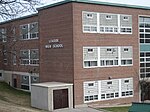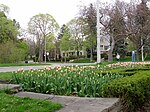CNIB Foundation

The CNIB Foundation (French: Fondation INCA) is a volunteer agency and charitable organization dedicated to assisting Canadians who are blind or living with vision loss, and to provide information about vision health for all Canadians. Founded in 1918 as the Canadian National Institute for the Blind (French: Institut national canadien pour les aveugles) to assist soldiers who had been blinded in the First World War, CNIB originally offered sheltered care and specialized employment to people with vision loss. It has since expanded to include other programs and services, including research, public education, rehabilitation counselling and training, advocacy and an alternative-format library for people living with a print disability. It is a member of the Braille Authority of North America.
Excerpt from the Wikipedia article CNIB Foundation (License: CC BY-SA 3.0, Authors, Images).CNIB Foundation
Bayview Avenue, Toronto
Geographical coordinates (GPS) Address External links Nearby Places Show on map
Geographical coordinates (GPS)
| Latitude | Longitude |
|---|---|
| N 43.717930555556 ° | E -79.377686111111 ° |
Address
Canadian National Institute for the Blind (CNIB)
Bayview Avenue 1929
M4G 0A7 Toronto (North York)
Ontario, Canada
Open on Google Maps








